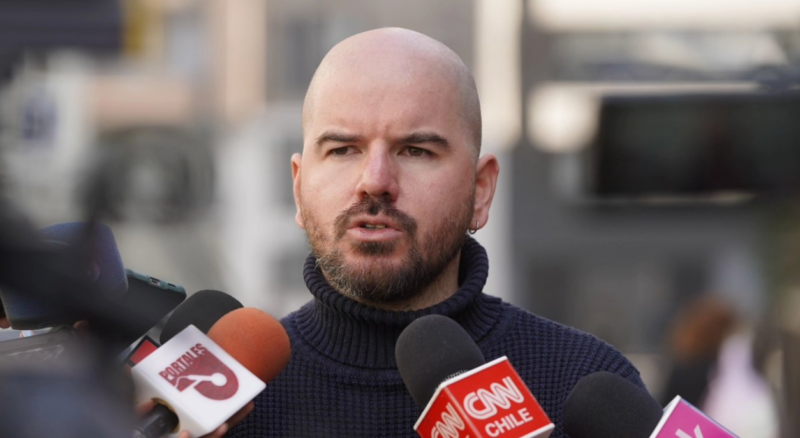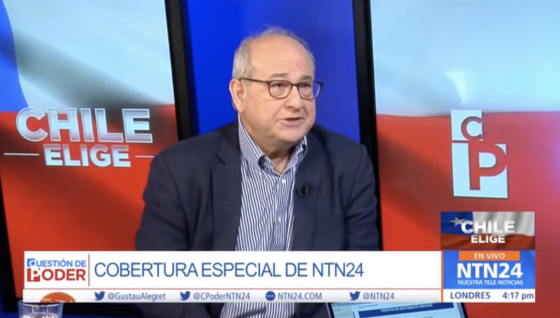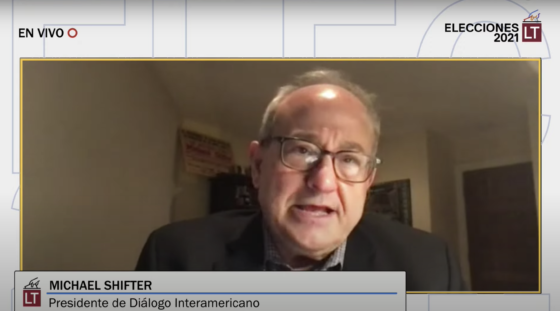
Will Newcomers Shake Up Chile’s Political System?
A Latin America Advisor Q&A featuring experts’ views on Chile’s presidential primaries of July 18.
A Daily Publication of The Dialogue
Chile’s social development minister, Giorgio Jackson, resigned on Aug. 11 amid a corruption scandal targeting him and other leaders of his Democratic Revolution party. Jackson was a confidant of President Gabriel Boric. What kind of reconfiguration will Jackson’s departure trigger within the ruling party? How will opposing right wing factions take advantage of this reshuffling? What does Jackson’s departure mean for Chile’s left, and for Boric’s agenda?
Peter Siavelis, professor of politics and international affairs at Wake Forest University: “Giorgio Jackson’s resignation represents a major blow to President Gabriel Boric. Jackson is one of the president’s closest confidants from the 2011 student movement—a group of activists who catapulted themselves from the streets to the corridors of formal power. This second cabinet reshuffle within just 17 months underscores the instability within Boric’s government. However, this resignation is particularly harsh given Boric and Jackson’s close relationship as long-time friends and co-founders of the Frente Amplio coalition. Jackson cast his resignation as a move to eliminate the ‘excuses’ advanced by the right-wing opposition to hold up the president’s ambitious health care and pension reform agenda. The controversy surrounds irregular fund transfers of nearly half a million dollars to a private foundation tasked with aiding economically vulnerable populations and tied to the President’s Revolución Democrática party. What initially appeared to be an isolated incident quickly unraveled into a more widespread scandal, with similar transfers discovered throughout the country, further implicating members of the president’s party. Jackson’s departure comes in the wake of a relentless onslaught of charges against former cabinet members, demonstrating that the right-wing opposition parties are out for blood. Although conclusive evidence of wrongdoing remains elusive, public trust in the administration has dwindled, with the president’s approval rating plummeting to 27 percent. Even with the resignation, pressure from the right is unlikely to subside, as it has consistently flexed its muscles to derail the president’s agenda. These realities pose formidable obstacles to Boric’s efforts to rebuild public confidence and advance his policy agenda.”
Manuel Agosin, professor in the School of Economics and Business at the University of Chile: “The resignation of Giorgio Jackson has further weakened the Boric government. However, it is doubtful that it will further damage what already is a weak government. Certainly, the corruption scandals are weighing heavily on the government’s very low capacity to get its agenda approved. But the Boric administration has not understood that, with a minority in Congress, it must negotiate in order to reach, however partially, its goals. Boric himself and many in his administration view negotiation as caving in. Unfortunately, that is not the way democracies work. With some negotiation and without so many red lines, which are basically ideological, the administration could partially achieve many of its goals. For example, the goal of improving pensions for low-income people can be achieved without redesigning the whole pension system. Unfortunately, an unstated objective of the administration is to end the current system by establishing a new entity to do much of the functions of the AFPs, the private firms that now receive and manage the funds of future retirees. If it understood that the government does not have the votes to kill the AFPs, which it views as a legacy of the Pinochet dictatorship, it could achieve its aim of improving pensions for low-income people using the institutional set up the country already has for pensions, which includes a lump sum pension for low-income people and the individual capitalization system administered by the AFPs.”
Carla Alberti, assistant professor of political science at the Institute for Political Science at the Pontificia Universidad Católica of Chile: “Jackson’s resignation certainly weakened the ruling coalition and, in particular, the Democratic Revolution party he founded. The party lost important ministries (social development and education), and the fact that it became directly associated with the corruption scandals is expected to weaken its position even further. Additionally, the lack of effective leadership amid the corruption accusations signals that the party’s crisis is deeper and more structural. Right-wing parties have taken advantage of this reshuffling, as this entailed the departure of one of President Boric’s closest allies, both personally and politically, which these factions had previously attempted to achieve through an impeachment. Moreover, the fact that such an important member of the ruling coalition paid the cost for the corruption scandal further contributes to the weakening of his sector as a whole. Jackson’s departure implies a strong symbolic loss for the ruling coalition and for the president in particular. However, this reshuffling should not lead to an important change in the government’s program, as the new appointed ministers are also close allies of the president.”
Daniela Jara Leiva, professor in the Department of Sociology of the University of Valparaíso: “Giorgio Jackson’s resignation took place weeks after the right-wing imposed pressure by blocking negotiations for key projects such as tax and social security reforms. His resignation certainly evidences the existence of a new power configuration within Congress and the Constitutional Council, where the right and the far right have a majority, respectively. This new configuration of forces explains the difficulty that President Boric has had in executing his agenda and demonstrates the need to build wide agreements. The Jackson episode is a reminder of other pressures that Michelle Bachelet’s government suffered to avoid implementing profound changes. Boric’s administration will require strengthening agreements with the center-left, and it should be very assertive in sending clear signals to the citizenry in regards to corruption, redoubling its communication efforts with less moral narratives and more presence on the ground.”
Patricio Navia, clinical professor of liberal studies at New York University and professor of political science at Universidad Diego Portales in Chile: “Cabinet shuffles always reflect trouble in an administration. But when the cabinet shuffle includes the closest advisor to the president, the signs of trouble are even more evident. Giorgio Jackson was not just an important minister in the cabinet; he was the unquestionable intellectual leader of the Broad Front coalition that brought Boric to the presidency. For 12 years, Jackson represented the effort to replace the traditional left-wing Concertación/Nueva Mayoría coalition with a new left-wing coalition, the Broad Front, which espoused more radical positions. In 2021, the presidential candidate of that coalition was Gabriel Boric, the second aboard, simply because Jackson was not yet 35 years old, the minimum age required to run for the presidency. Jackson’s departure confirms the defeat of the hostile takeover effort to replace the traditional left-wing coalition. Now, President Boric relies primarily on ministers affiliated to traditional left-wing parties—those parties that Jackson and Boric wanted to send into permanent retirement. The policy implications of Jackson’s departure will be more limited. President Boric had already abandoned most of his radical reformist policies after the defeat of the new constitutional draft in the September 2022 plebiscite. But Jackson’s departure makes the political failure of the Broad Front’s effort to move the country radically further to the left even more evident. The good news is that the country will no longer seek to implement state-centered policies that have failed wherever they have been tried. The bad news is that Chile needs urgent reforms to promote economic growth and social inclusion. As the Boric administration is now too weak to lead any reforms, policy immobility might threaten political stability and might feed support for radical left or right-wing populist candidates in future elections.”
 The Latin America Advisor features Q&A from leaders in politics, economics, and finance every business day. It is available to members of the Dialogue’s Corporate Program and others by subscription.
The Latin America Advisor features Q&A from leaders in politics, economics, and finance every business day. It is available to members of the Dialogue’s Corporate Program and others by subscription.
A Latin America Advisor Q&A featuring experts’ views on Chile’s presidential primaries of July 18.
Michael Shifter, presidente del Diálogo Interamericano, y Sergio Bitar, miembro del consejo asesor de Idea Internacional e investigador del Dialogo Interamericano, participaron en una entrevista con Gustau Alegret de NTN24 para analizar las elecciones en Chile. Según Shifter, el país está pasando por una “prueba de fuego” debido a la gran incertidumbre respecto lo que va pasar y la inevitable elección del mal menor. Sin embargo, a pesar de que muchos partidos tradicionales han colapsado, Shifter señaló que los jóvenes están jugando un papel más fuerte y están cada día más involucrados en el liderazgo del país.
Michael Shifter, presidente del Diálogo Interamericano, participó en una entrevista con La Tercera para hablar sobre la segunda vuelta de elecciones en Chile. En la entrevista se trato sobre los temas más urgentes que el próximo presidente deberá abordar, la plataforma política de Boric vs Kast, y las ventajas y preocupaciones de cada candidato.
 Chilean Social Development Minister Giorgio Jackson, a confidant of the country’s president, stepped down from the cabinet this month. // File Photo: @GiorgioJackson via X.
Chilean Social Development Minister Giorgio Jackson, a confidant of the country’s president, stepped down from the cabinet this month. // File Photo: @GiorgioJackson via X.
 Video
Video
 Video
Video